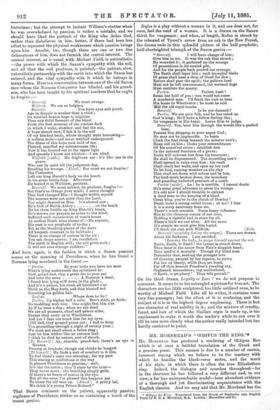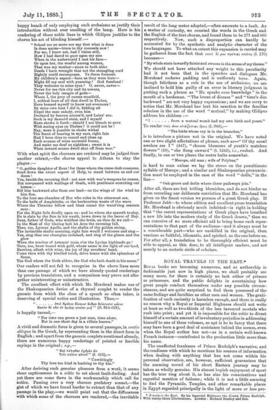MR. MORSHEAD'S " CEDIPUS THE KING."* Ma. MORSHEAD has produced
a rendering of CEdipus Res which is at once a faithful translation of the Greek and a genuine poem. This success is due to a number of causes, foremost among which we believe to be the mastery with which he handles the blank-verse metre, and the merit of his style, in which there is often the true Elizabethan ring. Indeed, the dialogue and speeches throughout—for iu the choruses he has followed a very different and, in our view, a far less unimpeachable model—bear abundant evidence of a thorough and yet discriminating acquaintance with the English classics. And we may add that Mr. Morshead has the
* GEdipue the King. Translated from the Greek of Sopbocles into English Verse by B. D. A. Morehead, M.A. London Macmillan and Co.
happy knack of only employing such archaisms as justify their introduction without ever smelling of the lamp. Here is his rendering of those noble lines in which CEdipus justifies to the chorus his act of blinding himself :—
" School me no more nor say that what is done
Is done amiss—trues to thy counsels now !
For me, I know not, had I vision still, How I had dared to gaze upon my are
When in the underworld I met his face—
Or upon her, the woeful among women, That was my mother—since to both alike Deeds I have wrought that not the strangling cord Rightly could recompense. Ye deem forsooth
My children's aspect—born as they were born—
Might fill my soul with yearning P God forefend !
They welcome to mine eyes P 0, never, never—
Never for me this city and its towers,
Never the holy images of gods—
Whom I, the prey of curses manifold, I, noblest born of all that dwell in Thebes, Have banned myself to know not evermore !
By mine own hest I did it, bidding all Expel the man unholy, even him Declared by heaven accnre'd, and Lajas' son.
Such is my damned stain, and I myself Have shown it forth—should I not blench to gaze
With seeing eyes on Thebes P it could not be !
Nay, were it possible to choke withal The fount of hearing in my ears, right fain Had I been thus to cancel and close up Each avenue of mine accursed frame, And make me deaf as sightless ; sweet it is When inward senses dwell shut off from woe."
With what spirit the choruses are rendered may be judged from another extract,—the chorus appeal to Athena to stay the plague :—
"0, golden daughter of Zeus ! for those whom the curse doth consume, Send down the sweet aspect of Help, to stand between us and our doom !
Yea, banish the ravening God : not now with war's weapons he comes, But compassed with wailings of death, with pestilence scorching our homes—
Bid him backward afar from our land—on the wings of the wind let him flee, To the lone sea-chamber of Her who rules in the uttermost sea, To the halls of Amphitrite, or the harboarless waste of the wave Where the Thracian billow and blast round the wttnd'ring seamen rave : For the Night falls deadly upon us : and he whom she spareth to slay, He is slain by the San in his wrath, hewn down in the havoc of Day. Zeus, father of Gods, who wieldest the levin, on thee do we call— In the blast of thy blazing bolt let Ares the ravening fall.
Thee, too, Lycean Apollo, and the shafts of thy golden string, The invincible shafts unerring, right fain would I welcome and sing— Yea sing thee our champion ordained, and sing of the gleam and the glow When the torches of Artemis' train o'er the Lycian highlands go ! Thou, too, brow-bound with gold, whose name is the light of our land, Bacchus, aflush with wine the joy of thy revellers' band, Come thou with thy kindled torch, drive hence with the splendour of flame, The God whom the Gods abhor, the God who lath death in his name."
Our readers will not fail to recognise in the above lines more than one passage of which we have already quoted renderings by previous translators, and a comparison may prove not alto- gether uninteresting or uninstructive.
The excellent effect with which Mr. Morshead makes use of the Shakespearian device of a rhymed couplet to render the gnomic form which the close of a speech so often takes, is deserving of special notice and illustration. Thus,—
" &el Xpivos 8bcatov &s4pcs Seircvtartv Fufros 'Catchy S'k K&V ?1, ilLEpC5. 71/0inS if" (11. 614.615), is happily turned,— " Por time can prove a just man, time alone, But in one short day is a villain known."
A vivid and dramatic force is given to several passages, in oratio obliqua in the Greek, by representing them in the direct form in English ; and apart from the gnomic couplets mentioned already, there are numerous happy renderings of pointed or forcible sayings in the original ; e.g.,— " !Cal AiXneas ?xfipbs dv Tar Irainv csirroi; " (1. 415),— " Unwittingly Thy love too kind is loathing to thy kin."
After deriving such genuine pleasure from a work, it seems sheer captiousness in a critic to set about fault-finding. And yet there are some flaws in the workmanship which call for notice. Passing over a very obscure prefatory sonnet,—the gist of which we have found harder to extract than that of any passage in the play,—we would point out that the diffuseness with which some of the choruses are rendered,—the inevitable result of the long metre adopted,—often amounts to a fault. As a matter of curiosity, we counted the words in the Greek and the English of the first chorus, and found them to be 271 and 660 respectively. Now, such a disproportion can hardly be accounted for by the synthetic and analytic character of the two languages. To what an extent this expansion is carried may
be gathered from the fact that voasi Ii erpoaretc as64105. (I. 170) becomes— "My whole state inwardly faints and swoons in the stress of my throes.' We should not have attached any weight to this peculiarity had it not been that in the speeches and dialogues Mr. Morshead eschews padding and is uniformly terse. Again, though felicitous as a rule in the use of archaisms, we are inclined to hold him guilty of an error in literary judgment in putting such a phrase as "He speaks sans knowledge" in the mouth of a herdsman. "The brunt of disease" and "time's dim backward" are not very happy expressions ; and we are sorry to- notice that Mr. Morehead has lent his sanction to the familiar solecism in the use of the word "mutual," by making CEdipus address his children :— "I from a mutual womb had my own birth and yours."' To render Taq GGIOW rthseCarrotg O'parg (1. 966),— " The birds whose cry is in the branches," is to introduce a picture not in the original. We have noted one or two slight affectations of phrase, such as—" Of thy scowl aweless am I" (447), "chosen blossoms of youth's mateless flowers" (18), "she flung onward" (1. 1242), i.e., rushed. And finally, in one or two places the metre halts somewhat.
"Merope, old man ; wife of Polybus,"
is hard to scan unless we lay the stress on the penultimate Syllable of Merope ; and a similar and Shakespearian pronuncia- tion must be employed in the case of the word "defile," in the line- " Oak-grove and defile where three pathways join." After all, these are but trifling blemishes, and do not hinder us from recording our deliberate conviction that Mr. Morshead has- given us the finest version we possess of a great Greek play. If Professor Jebb—to whose edition and excellent prose translation Mr. Morshead is obviously much indebted—is right in holding that "the recent representations of Greek plays have breathed a new life into the modern study of the Greek drama," then we can conceive of no more efficient aid to bring home such repre- sentations to that part of the audience—and it always must be a considerable part—who are unskilled in the original, than versions so faithful, idiomatic, and spirited, as the one before us. For after all, a translation to be thoroughly efficient must be able to appeal, as this does, to all intelligent readers, and not merely to an esoteric circle of scholars.



































 Previous page
Previous page